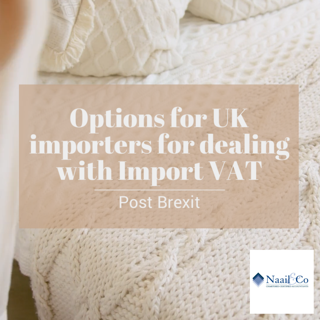Options for UK importers for dealing with post-Brexit Import VAT
Table of Contents
Overview
From 1 January 2021, trade between UK and European Community significantly changed. Currently the business who is UK VAT registered must account for import VAT for all imports from EU to the UK (except Northern Ireland).
There are few ways to do it:
1. Traditional C-79 claim
The first and the most well-known way is to pay your import VAT on the clearance of the goods into free circulation and then reclaim the VAT back on the quarterly VAT returns using monthly C-79 statements provided by HMRC. These rules had been applicable to the non-EU imports before; therefore, businesses already know this method of dealing with import VAT. The biggest disadvantage of this method is a negative affect on the cash flow, as import VAT is payable at the stage of realizing goods from customs, it creates a short-term deficit in your cash till the time the VAT return is submitted to HMRC.
2. Postpone Import VAT Account (PIVA) scheme
Second way of reporting of import VAT is Postpone Import VAT Accounting scheme. That is one of the most popular option to report the import VAT to HMRC. It was introduced from 1 January by the UK Government.
The idea of PIVA is the importer would record the value of import VAT on the VAT return using reverse charge mechanism (HMRC will issue monthly import VAT statements the 6th working day the following month and the importer should adjust box 1 and box 4 for the value of these statements in the period). All purchases from outside of the UK should be recorded in box 7 as zero-rated purchases. You do not need to register to use this scheme, however when completing your customs declaration, you should select to account for import VAT on your VAT Return. You cannot change how you want to account for import VAT on your customs declaration once it is submitted.
The PIVA statement forms a vital part of your VAT accounting records. Therefore, you will need to download, reconcile, and retain copies for your records because the statements would be available online only for six months after the month end. Any discrepancies between your import records and PIVA statements should be investigated.
3. Deferment Account
The third way is Duty Deferment Account. You can apply for a duty deferment account to delay paying most customs charges, such as Customs Duties, excise duties and import VAT.
A duty deferment account lets you make one payment a month through Direct Debit instead of paying for individual consignments. You should apply for Duty Deferment account using the link https://www.gov.uk/guidance/apply-for-an-account-to-defer-duty-payments-when-you-import-or-release-goods-into-great-britain
You will have the option to apply for a guarantee waiver to avoid the need to get a Customs Comprehensive Guarantee (CCG), or you can continue to get a CCG.
If you are a UK registered business, but you are not registered for VAT, for all consignments from outside of the UK which valued less than £135 your supplier would be responsible to charge UK VAT and to pay it to HMRC. It means VAT on imported goods with a value of up to £135 will be collected at the point of sale, not the point of importation. UK supply VAT is due, rather than import VAT.
For consignments above £135 it is a little bit more complicated as they also attract import duty, which can range from 0% to 25% of the item’s value depending on what it is, what material it is made from and its declared value. There are thousands of different rates of duty and the system is difficult to navigate for unexperienced person. In general, courier services such as DHL or UPS would take care of all the duties and import VAT for a small admin fee.

Our service to you
If you are a self employed, business owner/director of company looking to get your accountancy and taxation matters sorted, look no further. We are pro-active and easily accessible accountants and tax advisors, who will not only ensure that all your filing obligations are up to date with Companies House and HMRC, but also you do not pay a penny more in taxes than you have to. We work on a fixed fee basis and provide same day response to all your phone and email enquiries. We will also allocate a designated accounts manager who would have better understanding of your and business financial and taxation affairs. Book a free consultation call using the link below.
Related pages:
Get further information from the following pages;
Related Blogs:
Get further information from the following blogs;
VAT on online services & digital platforms
G7 Finance Ministers agree 15% Global Tax agreement
EU VAT changes for UK retail businesses
Last call to join VAT deferral new payment scheme
Penalty rate for Covid deferred VAT rate
Subscribe to our newsletter
BUSINESS HOURS
Monday – Friday
- 9:00 am – 5:30 pm
Pages:
Menu








